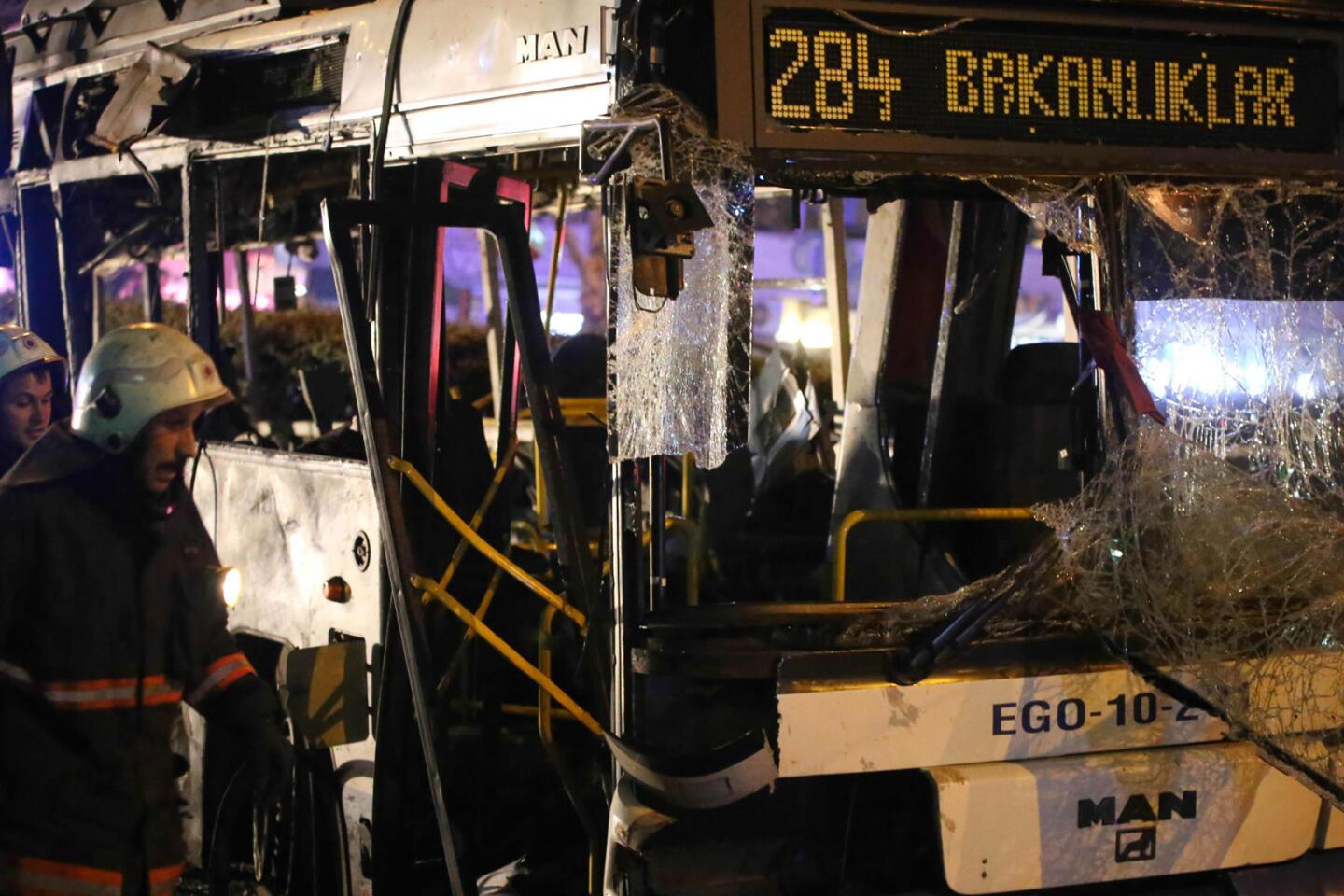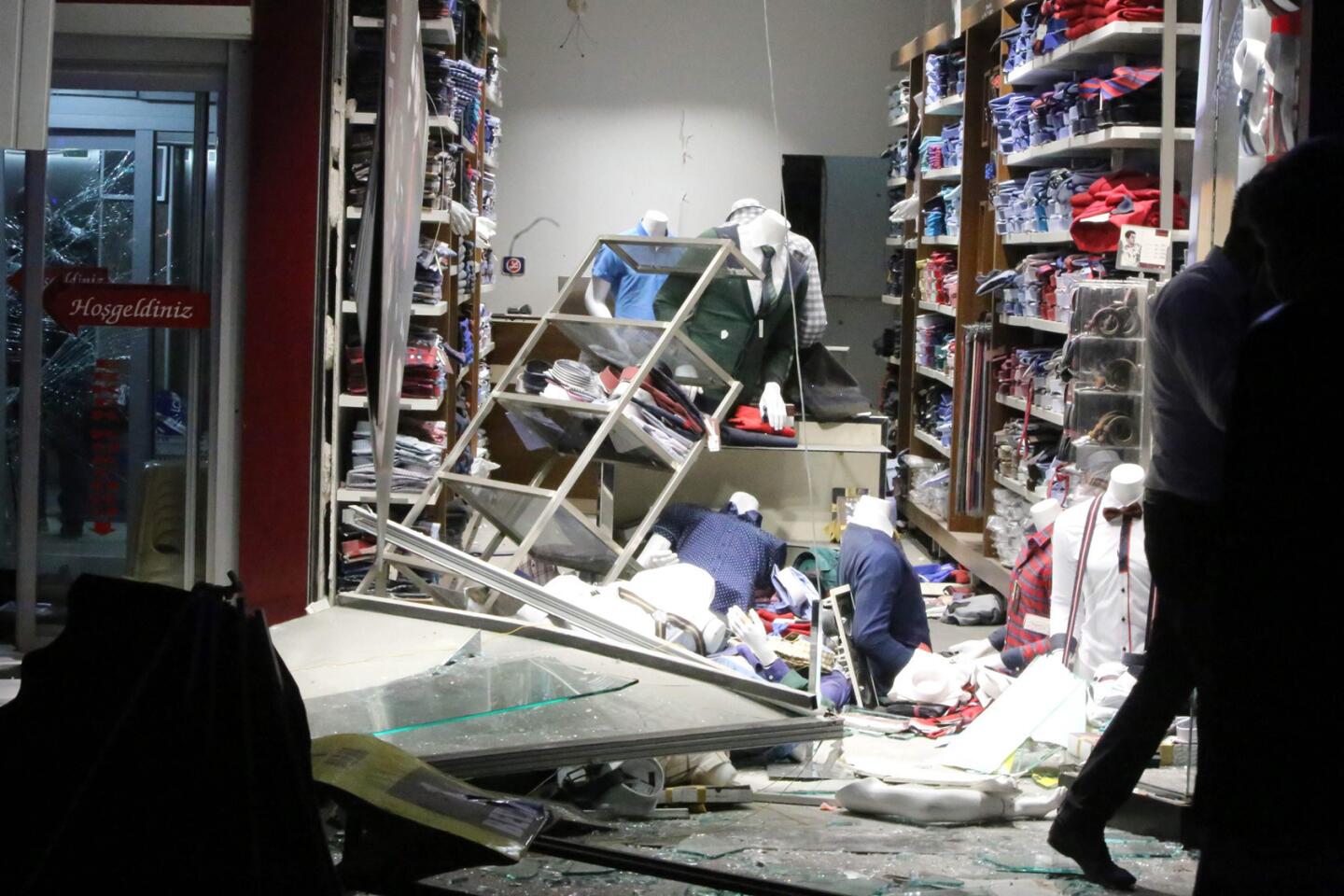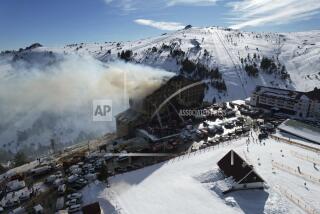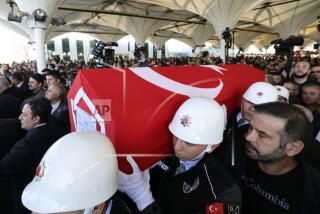Turkey carries out airstrikes after deadly bombing in Ankara
- Share via
Reporting from ANKARA, Turkey — Turkey lashed out at Kurdish targets on Monday, bombing military positions in northern Iraq and rounding up dozens of militants across Turkey, after a suicide car bombing in the heart of the capital drew the country even deeper into the complex Syrian conflict.
There was no claim of responsibility for the attack on bus stops that killed 37 people in Ankara on Sunday, but a senior government official said the two attackers — a man and a woman — were suspected of links to the Kurdistan Workers’ Party, or PKK. The official spoke on condition of anonymity because the investigation was continuing.
The attack further complicated Turkey’s place in the region as it battles a host of enemies across its borders including the Syrian government, Kurdish rebels in both Iraq and Syria, and Islamic State, even as it has been forced to absorb 2.7 million refugees from the conflict.
Turkey is also battling the PKK, a Kurdish group that has been fighting for autonomy in southeast Turkey for three decades. A fragile, 2½-year peace process broke down in July. Turkey blames the PKK, saying it was inspired by the success of the Kurdish militia forces in Syria against Islamic State in the city of Kobani and elsewhere. The PKK blames Turkey for failing to deliver on promises.
More than 200 people have died in five suicide bombings in Turkey since July that were blamed either on the Kurdish rebels or Islamic State. Sunday’s attack was the second suicide bombing in the capital; a Feb. 17 attack claimed by a PKK offshoot killed 29 people.
“All five attacks are linked to the fallout of the Syrian civil war,” said Soner Cagaptay, a Turkey expert at the Washington Institute. “Ankara’s ill-executed Syria policy ... has exposed Turkey to great risks.”
See more of our top stories on Facebook >>
Bill Park, a lecturer on Turkish foreign policy and security at King’s College London, said Turkey’s aggression toward the Kurds in Syria have angered the Kurds within Turkey and inspired attacks.
“Bombings in Turkey now look like a campaign, and we have to assume that there will be more,” he said.
If the bombing was the work of a PKK-affiliated group, it could mark a shift in tactics as the group had previously targeted members of Turkey’s security forces instead of civilians, said Otso Iho, a senior analyst at IHS Jane’s Terrorism and Insurgency Centre.
He said, however, that “any potential escalation of PKK attacks on purely civilian or tourist targets would likely be somewhat tempered by the group’s awareness of the need to maintain its public image internationally.”
Turkey considers the PKK and the Kurdish militia in Syria to be one and the same, and has been pressing its U.S. allies to stop helping the Syrian Kurds. Washington considers the PKK a terrorist organization, but has backed the Kurdish militia in Syria, which has been effective in fighting Islamic State.
Both Washington and Turkey have generally good relations with the Kurds in northern Iraq; Monday’s bombing in northern Iraq targeted PKK bases rather than installations of the Iraqi Kurds.
In the raids, nine F-16s and two F-4 jets raided 18 PKK positions, including in the Qandil mountains where the group’s leadership is based, the Turkish state-run Anadolu Agency reported. Ammunition depots, bunkers and shelters were among the targets hit.
NEWSLETTER: Get the day’s top headlines from Times Editor Davan Maharaj >>
Anadolu, citing unnamed security sources, said four people suspected of direct links to the bombing were detained in the southeastern city of Sanliurfa on Monday. The report didn’t say in what way they were suspected of involvement. Police, meanwhile, carried out raids in the southern city of Adana, detaining 38 suspected PKK rebels, and 15 suspected Kurdish militants were detained in Istanbul, the agency reported.
Turkey already had plans for large-scale operations against Kurdish militants. Anadolu said an operation in Nusaybin, on the border with Syria, began Monday, and tanks have been deployed for another operation in the town of Yuksekova, near the border with Iraq. Authorities also imposed a curfew on Monday in the city of Sirnak, near the Iraqi border, signaling that the military was preparing an offensive there as well.
Turkey has been imposing curfews in flashpoints in the southeast since August in its fight against the PKK, which had set up barricades, dug trenches and planted explosives. Tens of thousands of people have been displaced, and human rights groups have criticized the military for scores of civilian deaths.
The death toll in Sunday’s attack rose to 37 on Monday as three people died from wounds suffered in the attack. About 125 people were wounded, with 71 of them still hospitalized Monday. Of those, 15 were in serious condition.
Some of the victims were buried Monday, and details emerged of their identities.
Anadolu said one of the dead was the father of Umut Bulut, who plays for one of Turkey’s top soccer teams, Galatasaray. He was on his way back to his hotel after watching his son play when the blast occurred, the agency said, adding that the son didn’t learn of his father’s death until he showed up for training Monday.
Police officer Nevzat Alagoz, another victim, was heading home after working security for the same match, according to Anadolu.
Another of the victims, 19-year-old engineering student Ozan Akkus, had lost a close friend October bombings, the newspaper Hurriyet said.
ALSO
Afghan peace talks get a boost with Taliban rival signing on
As Syrian peace talks near, Bashar Assad’s future remains a sticking point
Multiple doctors gave Germanwings co-pilot sick leave certificates before crash
More to Read
Sign up for Essential California
The most important California stories and recommendations in your inbox every morning.
You may occasionally receive promotional content from the Los Angeles Times.













